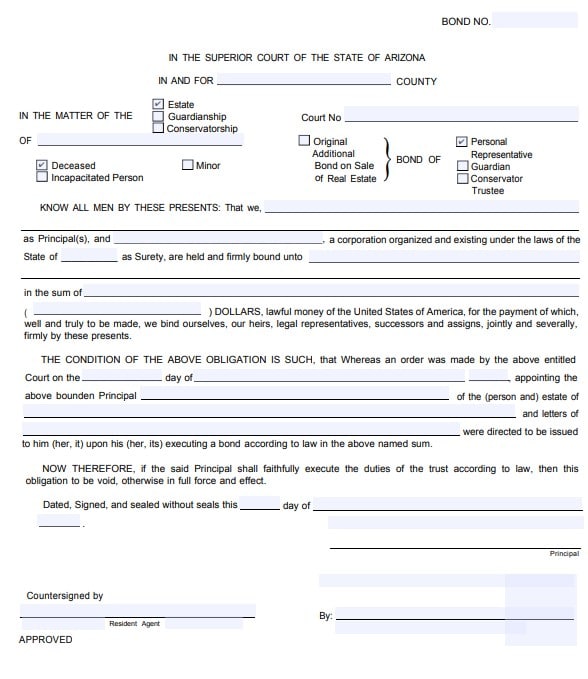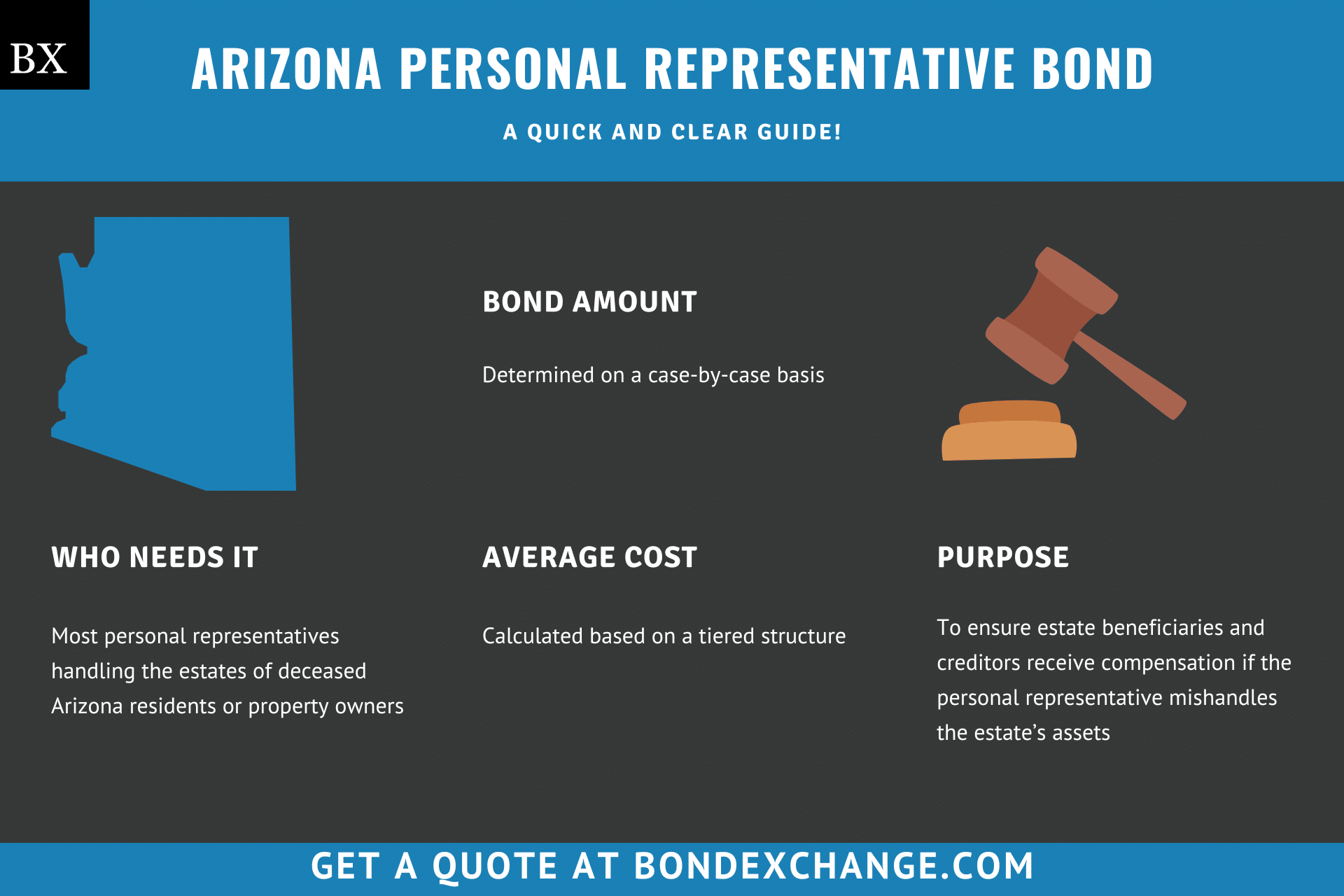Arizona Personal Representative Bond: A Comprehensive Guide
This guide provides information for insurance agents to help their customers obtain an Arizona Personal Representative bond.
At a Glance:
- Average Cost: Calculated based on a tiered structure
- Bond Amount: Determined on a case-by-case basis (more on this later)
- Who Needs it: Most personal representatives handling the estates of deceased Arizona residents or property owners
- Purpose: To ensure estate beneficiaries and creditors receive compensation if the personal representative mishandles the estate’s assets
- Who Regulates Personal Representatives in Arizona: The county court with jurisdiction over where the deceased individual resided or had property

Background
Arizona Statute 14-3103 requires all personal representatives of an estate to be appointed by a court before assuming their fiduciary duties. The Arizona legislature enacted the appointment requirement to ensure that personal representatives do not mismanage the estate’s assets. To provide financial security for the enforcement of this requirement, the court may require the personal representative to purchase a probate surety bond to be eligible for appointment.
What is the Purpose of the Arizona Personal Representative Bond?
Arizona requires personal representatives to purchase a surety bond as a prerequisite to being appointed as a fiduciary over an estate’s assets. The bond ensures that the estate’s beneficiaries and creditors will receive compensation for financial harm if the personal representative fails to abide by the regulations outlined in Arizona Statute 14-3606. Specifically, the bond protects beneficiaries and creditors if the personal representative engages in acts of fraud or mismanages the estate’s assets. In short, the bond is a type of insurance that protects the estate’s beneficiaries and creditors if the personal representative violates their fiduciary duties.
How Can an Insurance Agent Obtain an Arizona Personal Representative Surety Bond?
BondExchange makes obtaining an Arizona Personal Representative bond easy. Simply login to your account and use our keyword search to find the “Probate” bond in our database. Don’t have a login? Gain access now and let us help you satisfy your customers’ needs. Our friendly underwriting staff is available by phone (800) 438-1162, email or chat from 7:30 AM to 7:00 PM EST to assist you.
At BondExchange, our 40 years of experience, leading technology, and access to markets ensures that we have the knowledge and resources to provide your clients with fast and friendly service whether obtaining quotes or issuing bonds.
Not an agent? Then let us pair you with one!

Click the above image to find a BX Agent near you
How is the Bond Amount Determined?
Arizona Statute 14-3604 dictates that, unless the bond amount is specified in the will, the bond must be in an amount equal to the personal representative’s best estimate of the value of the estate’s assets, including the estimated income to be generated by the estate over the next year. The bond amount may be reduced by the value of all real estate that the will prohibits the personal representative from selling without approval from the court. The bond amount may also be reduced by the value of all of the estate’s assets deposited with the court or domestic financial institution that prevents unauthorized disposition.
Any interested person, including the personal representative, may petition the court to increase or reduce the required bond amount.
What are the Underwriting Requirements for the Arizona Personal Representative Bond?
Most surety companies will examine the following factors when determining eligibility for the Arizona Personal Representative bond:
- Personal representative’s credit history (not considered for bonds with limits less than $25,000)
- Whether or not the estate has an attorney (not considered for bonds with limits less than $25,000)
- How long the fiduciary appointment is for
- Whether or not the personal representative is replacing a prior fiduciary
- If the personal representative has ever committed a felony
- If there are disputes among the estate’s beneficiaries
- Whether or not there is any ongoing business in the estate
- If the bond is being required by a creditor
How Much Does the Arizona Personal Representative Bond Cost?
Surety companies typically determine the premium rate for personal representative bonds based on a tiered structure. As a result, larger bond amounts will be charged a lower premium rate than smaller bonds.
The following table illustrates the pricing structure for the Arizona Personal Representative bond:
$1,500,000 Personal Representative Bond Cost
| Bond Amount | Premium Rate | Total Bond Cost |
|---|---|---|
| First $20,000 | 0.75% | $150 |
| Next $40,000 | 0.60% | $240 |
| Next $140,000 | 0.50% | $700 |
| Next $300,000 | 0.375% | $1,125 |
| Next $1,000,000 | 0.25% | $2,500 |
| Total cost of $4,715 |
Who is Required to Purchase the Arkansas Personal Representative Bond?
Arizona requires personal representatives to purchase a surety bond as a prerequisite to obtaining a fiduciary appointment. To paraphrase Arizona Statute 14-1201, a personal representative is a court-appointed fiduciary responsible for administering a deceased individual’s estate. Personal representatives are referred to as executors if the deceased individual nominated them in their will, or administrators if they were not nominated in the will or if no will exists.
Personal representatives are not required to purchase a bond if:
- The will explicitly waives the bond requirement
- All heirs and devisees agree to waive the bond requirement
- They are a national banking association or holder of a banking permit, a savings and loan association, a title insurance company, or an authorized trust company
- They are the surviving spouse or his/her nominee and the estate is subject to summary procedures under Arizona Statute 14-3973
Any interested person may petition the court to require an exempt personal representative to purchase a bond.

How do Personal Representatives Become Appointed in Arizona?
Personal representatives in Arizona must navigate several steps to become court-appointed fiduciaries. Below are the general guidelines, but applicants should refer to Arizona’s probate statutes for details on the process.
Step 1 – Meet the Qualifications
Personal representatives are ineligible for appointment if they are:
-
- Under the age of 18
- Found unsuitable by the court during proceedings
- A foreign corporation
Step 2 – Determine Priority
Priority to serve as a personal representative is granted in the following order:
-
- Persons nominated in the will
- The surviving spouse, provided that he or she is a devisee (entitled to real estate) of the estate
- Any other devisee
- The surviving spouse
- Any other heir
- If the deceased individual was a veteran or the spouse or child of a veteran, the Department of Veteran’s Services
- 45 days since the deceased individual died, any creditor (except a funeral home owner or director)
- The public fiduciary
Step 3 – Hire an Attorney
Although not explicitly required, it is highly recommended that personal representatives hire an attorney to assist with the probate process.
Step 4 – Determine the Estate Administration Type
Arizona has three different estate administration types with varying levels of court involvement, as outlined below:
-
- Small Estate: Available to estates whose value is less than the allowance in lieu of homestead, costs and expenses of administration, reasonable funeral expenses, and reasonable and necessary hospital expenses of the deceased individual’s last illness. In small estate administration, personal representatives may immediately disburse the estate’s assets to entitled persons without giving any notice to creditors.
- Informal Probate: Allows the personal representative to perform their duties with minimal court supervision
- Formal Testacy: The court closely supervises the administration of the estate and a hearing is held to determine the appointment of the personal representative and whether or not the deceased individual left a valid will. Any interested person may file a petition for formal testacy.
Step 5 – Contact the Court
Personal representatives must contact the county court with jurisdiction over the deceased individual’s estate. A representative of the court will walk the personal representative through the appointment process, provide them with all required forms, and answer any questions they may have. If an interested person petitions for formal testacy, a hearing will be required before the personal representative is appointed.
Step 6 – Purchase a Surety Bond
Unless otherwise exempt, personal representatives must purchase and maintain a surety bond (limits outlined above).
How do Arizona Personal Representatives File Their Bonds?
Personal representatives should submit their completed bond forms, including the power of attorney, to the district court of the county with jurisdiction over the estate.
The surety bond requires signatures from the company that issues the bond and the personal representative. The surety company should include the following information on the bond form:
- Court where the bond is to be filed
- Name of deceased individual
- Legal name of the entity/individual(s) buying the bond
- Surety company’s name and state of incorporation
- Bond amount
- Date the bond is signed
- Date the fiduciary appointment was made
What can Arizona Personal Representatives do to Avoid Claims Made Against Their Bonds?
To avoid claims against their bonds, personal representatives in Arizona must ensure that they:
- Do not mismanage the estate’s assets
- Fulfill their fiduciary duties
